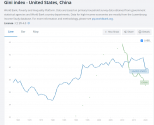View attachment 132432
Public opinion in China shifting away from nakedly pro-capitalist mindset. Folks have to remember that China has higher inequality than the US. When the economy was growing extremely rapid, it was easier to forgive that. But now that 5% is the new normal, people will become more critical of a supposedly "communist" party tolerating very high inequality.
I think this is something Western analysts miss when they claim Xi is some kind of ideological Maoist. He is merely responding to public opinion and public opinion in China is shifting left on economics.
You are correct to say that The Chinese government has of course long recognized the issues with inequality, which is why in the last couple of years the CPC have been getting their common prosperity drive revved up.
But I'm not sure where your gini comparison is from. For example the world bank's comparison of the US and China shows that China's is still quite a bit below the US and if anything China's gini coefficient has been declining after peaking in the early 2010s.

